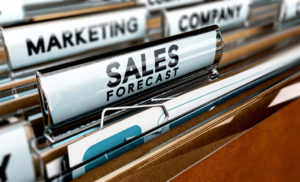 Why is Forecasting important?
Why is Forecasting important?
Where do you want your business to be in 5 – 10 years? Creating an accurate financial forecast for a business is a valuable tool. Forecasting addresses growth, capacity, and resource needs. Forecasting helps with the achievement of goals / targets, and provides confidence for stakeholders (lenders and shareholders), and should be considered along with any reputable business plan. Preparing accurate forecasts involves an in-depth understanding of your industry and external economic factors that may impact the business. Achievable revenue needs to be evaluated, along with fixed and variable costs (expenses). After anticipated revenues and expenses are determined, a cash flow statement and balance sheet can be prepared. Business appraisers can use forecasts in determining the value of a company by using a discounted cash flow model. This article focuses on forecasting revenue. Future articles will address other considerations (as mentioned above).
Preparing a Forecast is Challenging
Most people don’t know what their weekend plans are going to be, so how can someone be expected to accurately forecast their company’s financial results 1, 3, or 5-plus years into the future?Although it is difficult, forecasts can be accurately prepared by paying close attention to the company’s historic performance and respective industry, and by being based on objective and supportable expectations.
Considerations when forecasting revenue:
- Question forecast in conjunction with historical results.
- Reconciling a businesses’ historical trends with forecasted trends – Are the businesses’ revenues trending upwards, downwards, do they fluctuate year-to-year or are they generally flat (no material changes)? How does the company compare to the industry? Are there other economic factors that impact the business?
- If the company has reported 5-years of flat (no growth) revenue, why should a forecast expect revenue to grow at 10 percent? The Company’s recent history does not appear to support such growth expectations
- Question forecast in conjunction with industry.
- If the industry is expected to grow at 2 percent over the next 5 years, is it reasonable to expect that the business will materially deviate from the industry?
- If the expectations are unreasonable, the result would not only inflate the forecasted revenue but will likely effect certain variable expenses and cash flow of the business, as well.
- Does the company use forecasts in the ordinary course of business, or was the forecast prepared for a specific purpose?
- Additional credence to a forecast can be established if the company has historically used forecasts and these forecasts were materially accurate.
From another perspective…
If the business is relatively new and has experienced sizable annual growth in its first few years (i.e. 8 – 12 percent per year), is it reasonable to assume that the company will continue growing at this pace for another 3, 5 or 10 years when preparing a forecast? There are various reasons why this accelerated growth may not continue. The company may not be able to continue to grow at such rates due to their limited capacity for growth. For instance, a manufacturing business may be constrained by the size of their facility from growing much beyond a certain revenue level as they simply will not have the space to accommodate additional equipment and labor to generate this additional revenue.
Don’t overlook revenue
When preparing forecasts, many focus on the expense/cost categories and overlook revenue. However, accurately forecasting revenue is important and can play a major role in a budgeting and bench-marking process. Accurate revenue forecasting provides the initial blueprint for achieving the financial performance goals of a business. We can help you with your forecasting needs, please contact us for more information.

